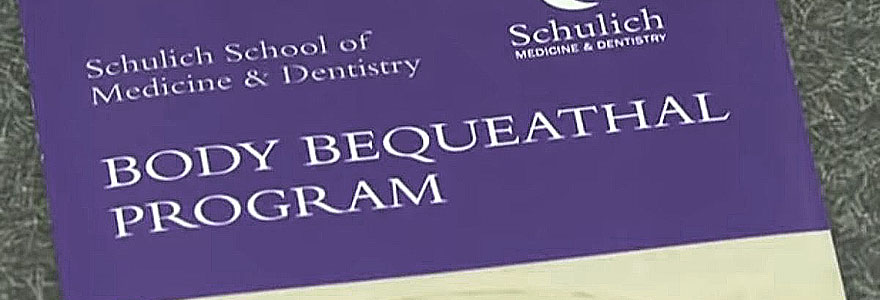Body Bequeathal
about_us/pdf/Form A 2021 on letterhead.pdf
Thank you for your interest in the Body Bequeathal Program at Western University (Download Brochure). This program plays an important role in both medical research and the teaching of anatomy to future health professionals, such as doctors, dentists, occupational therapists and physiotherapists. Your generous gift will
Forms for Donation
In order to signify your wish to bequeath your body to the Department of Anatomy and Cell Biology, Schulich Medicine & Dentistry, Western University, the approved procedure is as follows.
1. Advise your executor and family of your wish, and leave a signed copy of a *Form ‘A’ with them or with your important papers. It is important to have your executors aware of your desire to donate your body since the executor will need to make decisions regarding your final disbursement immediately after your death and before your will is read.
2. It may also help to have the following statement in your will so that the executor (and other family members) are assured that your wishes have been carried out: "Upon my death, I request that my body be made available to the Department of Anatomy & Cell Biology, Western University (or to the nearest medical school), to be used for medical education and research." Unfortunately, not all donors are accepted to this University. There are medical reasons and pre-existing conditions that may preclude your donation to the school.
* Contact the Department of Anatomy & Cell Biology, Schulich Medicine & Dentistry, Western University, to have this form sent to you.
Use and Final Disposition of Donations
The donated body will be used by the Western University for teaching and research purposes. Each student or researcher is required to treat the deceased with the utmost care and respect. Once the teaching or research study is completed, the remains are cremated at a local licensed crematorium, and then they are either returned to the family if
All charges incurred with regard to the transportation of the body to Western and the gathering of the required documentation is the responsibility of the estate. All expenses in connection with the ultimate cremation and interment of cremated remains in our University plot (approximately 18 months to 3 years following the receipt of the body) will be borne by the University. Notification of cremation and interment will be sent to the next of kin only if requested at the time of the donation. Relatives who wish to claim the cremated remains for private interment may do so, but in this case, expenses concerned with interment must be borne by the estate of the deceased.
Memorial Service
Each year, the Anatomy and Cell Biology Department
- National Post Article, May 11, 2004 (PDF, 6 KB)
Suitability for Donation
While each body bequeathed to the Department will normally be accepted, the Department of Anatomy and Cell Biology reserves the right not to accept a body. To avoid problems in embalming, it is necessary that we receive the remains within 48 hours of the time of death. There will be times when the requirements of Western and other universities have been met, and it is not possible to accept a body.
In addition, the following are not acceptable:
- Donors that have been embalmed
- Donors that have had recent major surgery
- Donors that have infectious diseases, e.g., tuberculosis, hepatitis, AIDS, etc.
- Donors considered morbidly obese; donors considered emaciated, e.g., donors are typically between 100-200lbs dependent on BMI
- Donors that have experienced trauma, e.g., an automobile accident
- Space limitations in the Body Bequeathal program
The following may be considered unacceptable at the time of death:
- Donors which have amputations
- Donors which have major internal disfiguration due to disease
- Donors that have had organs surgically removed (eye enucleation excepted)
For these reasons we always encourage a potential donor to make arrangements with a funeral home or transfer service in
Procedures at Time of Death
At the time of death, your next of kin or executor should seek your doctor’s assistance in contacting your local coroner who will know the procedure to be followed. If the coroner is not immediately available, telephone the Department of Anatomy & Cell Biology during business hours (519.661.3014) or after hours call the University Police (519.661.3300).
Funeral Home, Transfer Service or Hospital Information
Please see the following documentation on Western University's Policies and Procedures:








